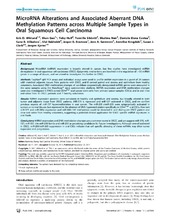| dc.contributor.author | Wiklund, Erik D. | en_US |
| dc.contributor.author | Gao, Shan | en_US |
| dc.contributor.author | Hulf, Toby | en_US |
| dc.contributor.author | Sibbritt, Tennille | en_US |
| dc.contributor.author | Nair, Shalima | en_US |
| dc.contributor.author | Costea, Daniela Elena | en_US |
| dc.contributor.author | Villadsen, Sune B. | en_US |
| dc.contributor.author | Bakholdt, Vivi | en_US |
| dc.contributor.author | Bramsen, Jesper B. | en_US |
| dc.contributor.author | Sørensen, Jens A. | en_US |
| dc.contributor.author | Krogdahl, Annelise | en_US |
| dc.contributor.author | Clark, Susan J. | en_US |
| dc.contributor.author | Kjems, Jørgen | en_US |
| dc.date.accessioned | 2012-02-27T09:31:47Z | |
| dc.date.available | 2012-02-27T09:31:47Z | |
| dc.date.issued | 2011-11-22 | eng |
| dc.Published | PLoS ONE 6(11): e27840 | en |
| dc.identifier.issn | 1932-6203 | |
| dc.identifier.uri | https://hdl.handle.net/1956/5640 | |
| dc.description.abstract | Background: MicroRNA (miRNA) expression is broadly altered in cancer, but few studies have investigated miRNA deregulation in oral squamous cell carcinoma (OSCC). Epigenetic mechanisms are involved in the regulation of .30 miRNA genes in a range of tissues, and we aimed to investigate this further in OSCC. Methods: TaqManH qRT-PCR arrays and individual assays were used to profile miRNA expression in a panel of 25 tumors with matched adjacent tissues from patients with OSCC, and 8 control paired oral stroma and epithelium from healthy volunteers. Associated DNA methylation changes of candidate epigenetically deregulated miRNA genes were measured in the same samples using the MassArrayH mass spectrometry platform. MiRNA expression and DNA methylation changes were also investigated in FACS sorted CD44high oral cancer stem cells from primary tumor samples (CSCs), and in oral rinse and saliva from 15 OSCC patients and 7 healthy volunteers. Results: MiRNA expression patterns were consistent in healthy oral epithelium and stroma, but broadly altered in both tumor and adjacent tissue from OSCC patients. MiR-375 is repressed and miR-127 activated in OSCC, and we confirm previous reports of miR-137 hypermethylation in oral cancer. The miR-200 s/miR-205 were epigenetically activated in tumors vs normal tissues, but repressed in the absence of DNA hypermethylation specifically in CD44high oral CSCs. Aberrant miR-375 and miR-200a expression and miR-200c-141 methylation could be detected in and distinguish OSCC patient oral rinse and saliva from healthy volunteers, suggesting a potential clinical application for OSCC specific miRNA signatures in oral fluids. Conclusions: MiRNA expression and DNA methylation changes are a common event in OSCC, and we suggest miR-375, miR- 127, miR-137, the miR-200 family and miR-205 as promising candidates for future investigations. Although overall activated in OSCC, miR-200/miR-205 suppression in oral CSCs indicate that cell specific silencing of these miRNAs may drive tumor expansion and progression. | en_US |
| dc.language.iso | eng | eng |
| dc.publisher | Public Library of Science | eng |
| dc.rights | Attribution CC BY | eng |
| dc.rights.uri | http://creativecommons.org/licenses/by/2.5/ | eng |
| dc.title | MicroRNA Alterations and Associated Aberrant DNA Methylation Patterns across Multiple Sample Types in Oral Squamous Cell Carcinoma | en_US |
| dc.type | Peer reviewed | |
| dc.type | Journal article | |
| dc.description.version | publishedVersion | en_US |
| dc.rights.holder | Copyright 2011 Wiklund et al. | |
| dc.identifier.doi | https://doi.org/10.1371/journal.pone.0027840 | |
| dc.subject.nsi | VDP::Medical disciplines: 700::Basic medical, dental and veterinary science disciplines: 710::Medical molecular biology: 711 | eng |

